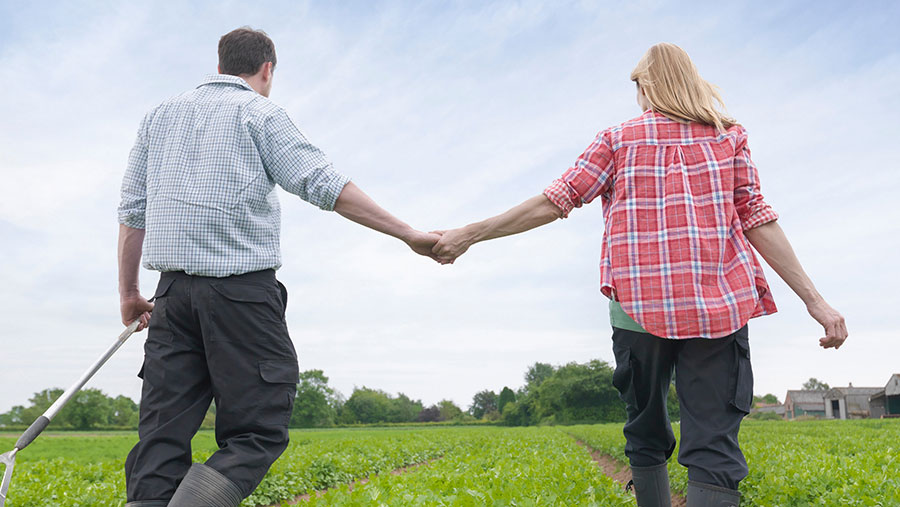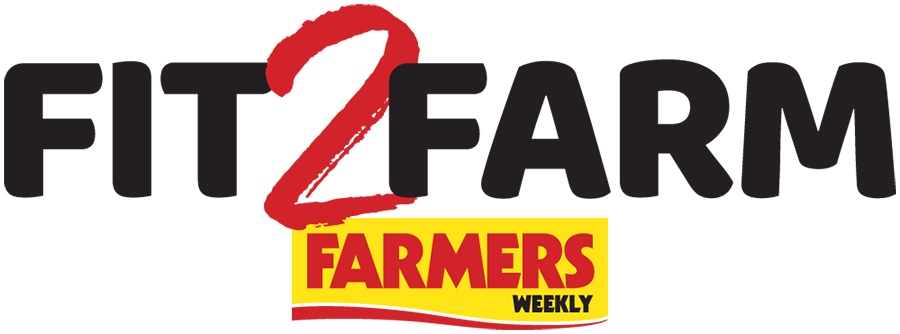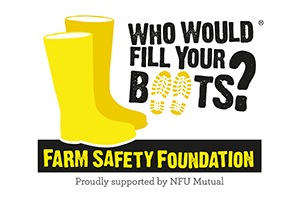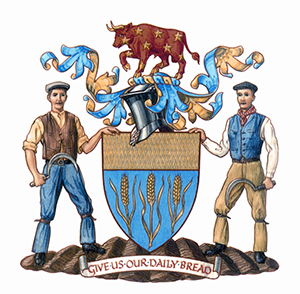Advice on fixing relationship problems for farming couples
 © Cultura/REX/Shutterstock
© Cultura/REX/Shutterstock Running a farm sometimes puts pressures on a relationship which can be hard to deal with for everyone involved.
Whether it’s the amount of time taken up by work, important events missed, or seeing what non-farming couples have time for – any number of things can upset an otherwise happy partnership.
We spoke to experts and partners of farmers to get their advice on how to deal with common problems when you’re in a relationship with a farmer.
Farming is not just a job, it’s a way of life, says Charles Smith, chief executive at the Farming Community Network. But knowing this doesn’t make it any easier to manage personal relationships.
See also: Where farmers in need can find charity help
Farming Community Network
“For farming families, life on the farm and life at home are one and the same. In many cases your spouse is also your business partner and accountant.”

Charles Smith
It’s for this reason that family farming needs a strong, harmonious, open and honest dynamic. Without it, the farm business can be put at serious risk, he warns.
“At FCN, we’ve seen far too often family relationships break down and farm businesses suffer because family members simply aren’t communicating effectively.
“We’ve seen husbands and wives separate because of the stress of running a farm,” he adds. “These relationship breakdowns can not only affect the farm business, they can often lead to mental health problems and, in some cases, suicide.”
This is why it’s so vital for farmers and their partners to talk about any issues they may have.
Advice from the Farming Community Network
- Take time out – Getting away from stressful situations is important for the sake of yourself and your relationship.
- Chill out – Get enough sleep and use some simple relaxation techniques.
- Leave it out – Cut down on bad food and alcohol and focus on improving your diet and drinking more water. “A sound body equals a sound mind.”
- Talk it out – Don’t deal with stressful situations alone. Instead, having a simple conversation with friends or family about your stresses can help.
- Consult professionals – If you feel you can’t talk to family and friends, speak to a healthcare professional or a third party such as FCN.
Stresses of harvest and moving house
Catherine Reynolds is no stranger to the demands of a farm and is one of many people who find their partner’s lifestyle challenging.
Her partner took on a council farm one year ago, running an arable contracting business, while Catherine has her own full-time job working in environmental education.

Catherine Reynolds
Taking on a new role and moving house, combined with her partner’s first harvest on the farm, meant that it has been hard for them to have any personal time together.
One difficulty has arisen from the struggle to hire staff to take over some responsibilities. “The problems he experiences are a knock-on for me,” says Catherine. “He’s incredibly driven, passionate and plans meticulously, and it’s hard to find someone else who’s the same.
“It means he can’t take time off. I see what other couples can do, and I get upset that we can’t do these things. You can feel resentful and angry and that you’re not important compared with the farm.”
Catherine also worries that the stress could lead to mental health strains and accidents – a concern which extends beyond her own circumstance to the wider farming community.
“I think it’s positive how it’s becoming more normal to talk about this, and help one another,” she says.
It is healthy to have other interests and to do things outside of
the farm, so the judgemental attitudes against taking time off also needs to shift, she adds.
“A positive approach and encouragement to take time off within the community would be refreshing, even though it can be so difficult.”
It’s not about complaining or moaning but letting off steam and sharing more, she says. “You can feel alienated as a farmer’s partner, so I’d love to connect with people feeling the same way.”
Relationship Advice
Family difficulties can be a challenge to address, but they won’t be resolved by silence. Dee Holmes, senior practice consultant at the relationship support charity Relate, offers some tips on how to overcome issues:
- Know that the farm will always be the first priority.
- Get yourself and/or the children involved with the farm.
- Try to see matters from both perspectives. Work can be seasonal, with busy and quieter periods, so prepare yourself for the hectic times and aim to use less full-on days to good effect.
- Ask questions. It might feel like the farming partner is choosing the farm over you, which leads to frustration and resentment. So ask if things could be done differently.
- Keep up the conversation about your feelings. It’s not about dishing out blame, instead say: “I realise that the farm is important but this is how I feel.”
- Consider taking up your own projects or a diversification.
- Accept the ups and downs but focus on the ups.
The Crazy Life of a Farmer’s Wife
After having her first child, Chloe Williams found herself very cut off from her farming husband.
#Feeling isolated and lonely, she came up with an idea that has since reached out and helped thousands of others.
Chloe set up the Facebook group, The Crazy Life of a Farmer’s Wife, which went from 50 members on its first day in August 2015 to almost 5,000 in September 2018.
“My mind is blown by the uptake – it’s become my life,” explains Chloe. It acts as a platform for other wives and partners to connect, share and talk about their lives, and help one another through difficulties.
Before setting up the group, Chloe had imagined she was alone in feeling cut off from her partner and the outside world, but has since found out that there are thousands of others in the same situation.
“The group makes it okay to speak out. It’s been a godsend to me and has definitely helped my marriage”, she says. “I’ve come to realise it’s normal, and being able to talk to people who understand makes you feel okay.”
Chloe’s advice

Chloe Williams
- “Farmers can’t change their lifestyle much but try to make set routines with your partner”
- “Spend more time in the field and yard”
- “Most importantly, make sure you talk to people – don’t bottle up feelings of stress or loneliness”
Financial Advice
Finances can also put a strain on farming relationships, but there are things that couples can do to help each other. Julia Banwell at Old Mill accountants offers some advice:
- Put life cover in place to accommodate family supported by the farm in case anything should happen.
- Build up off-farm savings through a pension fund, ISA investment or savings plan. Opt in to an employee pension scheme if one is available to you.
- While current interest rates are low, they won’t stay like that forever and you need to think very carefully about the impact on your personal and business expenditure if interest rates were, say, three times higher than at present.
- With that in mind, don’t rush to buy property – although it is largely agreed that buying your own home generally makes more sense than renting over the long term, it is sensible to avoid rushing in to buy a house until you have established your earnings and know where you want to live. Buying and selling properties is an expensive business and if you have to sell at a time when the value of the property has fallen and your equity is reduced, it can set you back years.
- Plan for partners and children to make sure finances will be available when they’re needed most.
- Minimise your tax bill but make sure you have enough money to live on now.
- Keep finances as simple as possible – do you need all those different bank accounts to keep tabs on?
- Be open and seek help if required – don’t ignore or hide financial difficulties.
Where to find help
- The Farming Community Network
The FCN helpline is open every day from 7am-11pm. Call 03000 111999, email help@fcn.org.uk or go to the FCN website.
- Relate
For relationship support, visit Relate’s website to start a free instant online chat with a trained counsellor or email relate.enquiries@relate.org.uk.
- Royal Agricultural Benevolent Institution (Rabi)
For financial support call Rabi’s confidential freephone helpline on 0808 281 9490 or email grants@rabi.org.uk. Visit the Rabi website for more information.

Farmers Weekly has launched a new campaign to help farmers discover how they can improve their own health, wellbeing and work-life balance.
It’s all about making sure you are in top shape, physically and mentally to run your farm business.
We’ve been joined by business and charities to raise awareness for this campaign. Read about our sponsors below and see more on farm health and wellbeing.
Read all of the articles in the Fit2Farm series
Fit2Farm: How farmers can improve their mobility to avoid injury
Fit2Farm: How a farmer’s wife helps others in tough times
Fit2Farm: Why farmers need to eat better and exercise more
Fit2farm: Wellbeing guru shares top health tips for farmers
Fit2Farm: How a better work-life balance benefits farm
Fit2Farm: Hard work and long hours take toll on farmers
Fit2Farm: FW campaign to improve farmers’ health
Video: Rugby star signs up to be Fit2Farm ambassador
Advice on fixing relationship problems for farming couples
Our sponsors

Bayer
Your wellbeing is just as important to your farm’s future as looking after your land, crops and animals. Looking after yourself helps you be more productive and confidently face new challenges.
At Bayer, we have health and nutrition at our core, so we are delighted to support Fit2Farm.
Find out more at cropscience.bayer.co.uk/wellbeing
Isuzu

Isuzu are proud to support UK farmers of today and as the pick-up professionals we understand that having the right tools and equipment are vital elements to making the working day go that much easier.
That’s why with Isuzu, our pick-ups are strong, durable and built to go the distance, so you can focus the job in hand.
Find out more about the Isuzu D-Max range on our website
Our charity partners
Farming Community Network

The Farming Community Network (FCN) is a voluntary organisation and charity that supports farmers and families within the farming community through difficult times.
FCN’s volunteers provide free, confidential, pastoral and practical support to anyone who seeks help, regardless of whether the issue is personal or business-related.
Helpline: 03000 111999
E-Helpline: help@fcn.org.uk
Helpline is open every day of the year from 7am to 11pm
Website: www.fcn.org.uk
Farm Safety Foundation

The Farm Safety Foundation is an award-winning charity raising awareness of farm safety among the next generation of farmers.
Through training and campaigns such as Farm Safety Week and Mind Your Head, the Foundation tackles the stigma around risk-taking and poor mental health, ensuring that that next generation of farmers is equipped with specific skills to live well and farm well.
Website: www.yellowwellies.org
Worshipful Company of Farmers

The complexity, risk and relentless uncertainty within agriculture today take a tremendous toll on all those who work in the industry; never before has resilience been so crucial.
Recognising this we are delighted to support this new initiative to promote good health and wellbeing. It’s a fresh approach and demonstrates that working together we are always stronger.
Website: farmerslivery.org.uk

